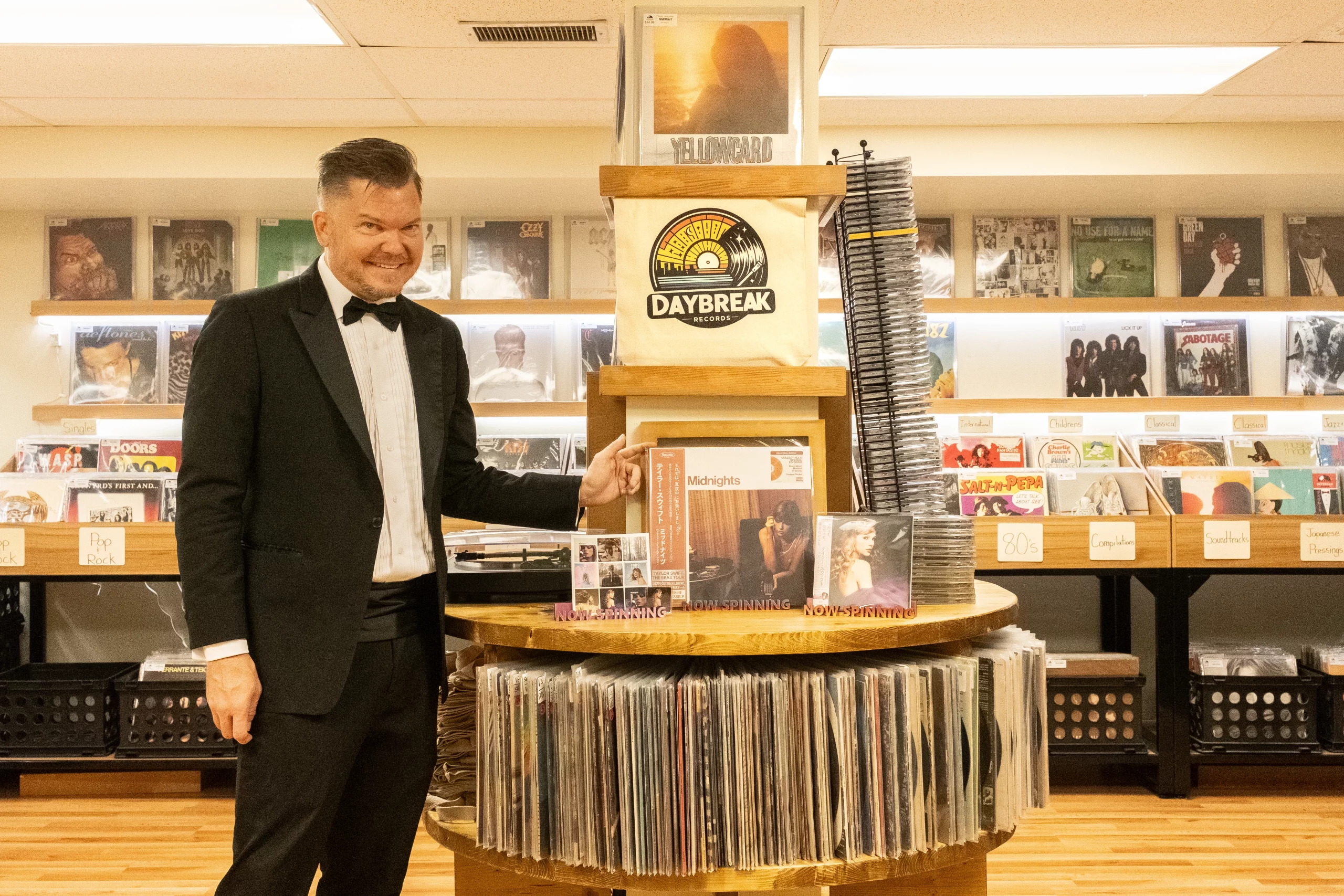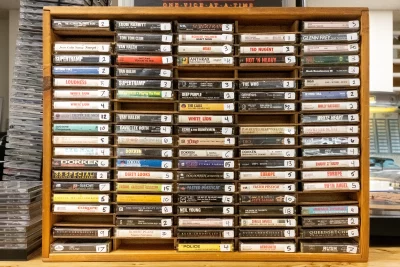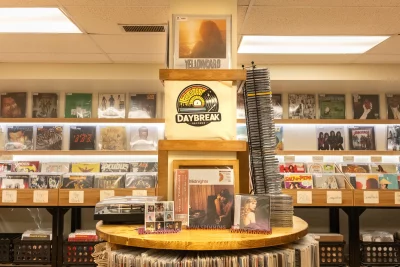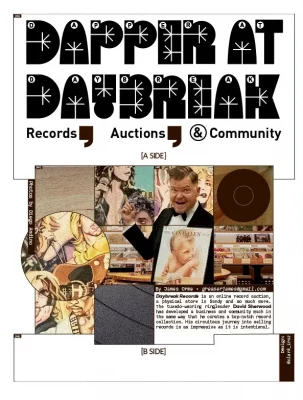
Dapper at Daybreak: Records, Auctions and Community
Music Interviews
Since the death of James Brown, the title of “hardest working man in show business” has been up for grabs, but David Sherwood might just have a claim to it. His weekly auctions and super sales were a Herculean effort already, before adding in the opening of a store in Sandy and a number of different charity projects to do in his seemingly nonexistent free time.
“Records, for me, are tangible pieces of art. They capture moments in time for me.”
Clad in a dashing tuxedo, Sherwood has turned his record collecting passion into a blossoming business. So how does a guy go from a fetishistic pastime to a purveyor of vinyl?
“Records, for me, are tangible pieces of art,” says Sherwood. “They capture moments in time for me. If I listened to an album with a girlfriend and then we broke up, that album was forever tainted. So then … certain records I wouldn’t listen to with anyone I was dating, because if we broke up then it might ruin that record for me. A record or a song can almost physically take me to a memory.”

Music holds a special place in the hearts of many, but for Sherwood, it was specifically vinyl that caught his eye and became the focus of his obsession. “I’ve always been a collector deep down in my heart,” says Sherwood. “I used to collect rocks as a kid. I weirdly worked backwards from MP3s to CDs to vinyl. The little nuances of collecting start to build up [until] you’re only collecting things in shrink wrap or they have to have hype stickers. Don’t even get me started on Japanese records—I have flown to Japan to specifically go to 53 record stores in a week.”
Now that music is available digitally, what could be the attraction to a tactile medium like vinyl? How can some people seemingly want to move backward toward this antiquated way of listening to music?
“For me, it’s how intentional you have to be with a record,” says Sherwood. “Taking it carefully out of the sleeve, placing it on the player, lining up the arm for the perfect needle drop … I dream about that … It’s ceremonial in a way, and a lot of people have a dedicated room or space for playing records and they put up their favorite band’s poster or stickers. There are some definite religious connotations to it.”
Sherwood has spent an inordinate amount of time and effort hunting down records—even traveling the world to buy whole collections. He set a world record earlier this year by visiting 23 record stores in a single day. Without knowing it, Sherwood was preparing for a major change he didn’t know was coming.
“My career track has been kind of wild. I went to college to be an English Literature professor and then switched to psychology. After college, I was recruited by the government and moved to Washington DC to work for OPM [United States Office of Personnel Management], which is the HR department for the government. I was doing 80-hour weeks. I got burnt out and decided I wanted to do something I loved, so I started a company developing a travel app. Life was good then; I was traveling and collecting records everywhere I went. But then the pandemic hit, and everyone stopped traveling, and my business was essentially wrecked, so I was trying to figure out how to pay my bills and survive. I had 15,000 records in my basement that I had accumulated over the years and had doubles and triples of some records, and I thought I could do an online auction and at least have a little fun.”
The auctions grew slowly at first, and as he struggled through those early days, Sherwood pushed through and devoted himself to making this endeavor a success.
“Starting a business sort of follows the same timeline of raising a child,” says Sherwood. “The first year is new and exciting, all these new feelings you’ve never felt before, and then year two there’s a lot of crying and a lot of work and no sleep. The beginning auctions were tough—not many people were attending, and I would put up a record and sometimes no one would bid on it, and I knew I had to change something. I started to study other auctions and what made them fun, and I discovered it was really about the community and building a group of people who love music. My fiancé Brook started to get involved and the appeal broadened from beyond the stereotypical record collectors. Now we have 17-year-olds into Nicki Minaj, whole families that are hunting for Disney records [and] couples having date nights while watching our auctions. It became something special, and I realized it wasn’t about the records; it’s about the people. We welcome everyone, politics and whatever else all get left at the door, and the auctions and other events became all about having fun while buying something they’re passionate about.”
“These guys made very little effort to be welcoming or inviting. They looked like they just got out of bed and doing the auction was some kind of inconvenience for them, and I wanted to change that, so I thought, ‘What if I was the best-dressed auctioneer in the world?’”
Sherwood’s trademark tuxedo and the game show elements of his auctions are two other ways that he lets people know that this is far from boring and that all are welcome.
“When I had watched these other auctions, there was a very impersonal feeling,” says Sherwood. “These guys made very little effort to be welcoming or inviting. They looked like they just got out of bed and doing the auction was some kind of inconvenience for them, and I wanted to change that, so I thought, ‘What if I was the best-dressed auctioneer in the world?’ It might signal to people that they’re dealing with a person of quality and at Daybreak Records, they’ll get quality records. Elements like a wall full of records with secret discounts or prizes or giving away credit developed out of naturally just wanting to have fun with it.”
Sherwood wants to develop a relationship with his customers, a word he told me he hates to use because so many of those who buy from him become his friends.

“I love seeing a person find a record that transports them or helps them through a hard time,” says Sherwood. “One of the ladies in our group had been talking about how she and her mother would listen to The Beatles’ “Blackbird” and how she could never find it on vinyl, so it became my mission to find her that song, and she told me how much it meant to her when she was missing her mom.”
Sherwood’s personal experiences led him to want to do something that would benefit others in need. The people who attend his auctions have fervently joined him in these efforts to make a difference for others.
“The charity stuff in the group grew out [of] the generosity of so many people. They were already giving each other records or giving me records and telling me to ‘Make someone’s day with this.’ My own mother’s cancer diagnosis was what originally brought me back to Utah, and the doctors were giving her only like a 4% chance [of survival], so I told myself if she made it through that I would find a way to give something back and the group seemed like a great opportunity to do some good,” explains Sherwood. “Primary Children’s [Hospital] is this amazing organization that helps families dealing [with] insurmountable problems, so we do a few things throughout the year to raise money for them. We have a vintage jukebox in our store that we sold slots to, and all the money that people put in the jukebox is donated as well. We do a ‘blank cover’ auction where our members create and design their own record covers that are bid on and proceeds from those are donated, and [there’s] a live in-person auction where we raise money as well.”
Daybreak Records has become something beyond just buying and selling records: It’s about a community enjoying the shared passion of music, supporting each other and finding ways to give back. Daybreak Records‘ new brick-and-mortar store is located in Sandy at 9445 S Union Square, Suite B. Every week, Tuesday super-sales and Wednesday auctions can be found in the Daybreak Records Facebook group.
 Graphic Designer: Clark Iroz | @clark_iroz
Graphic Designer: Clark Iroz | @clark_iroz
Read more music interviews here:
FIDiots Unite: A Conversation with Fidlar
Lucinda Williams Is Too Cool To Be Forgotten